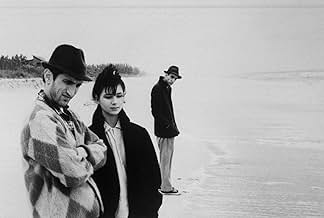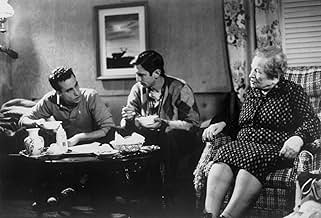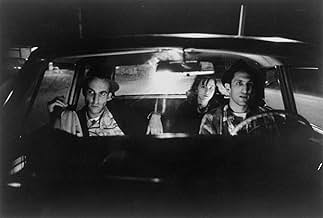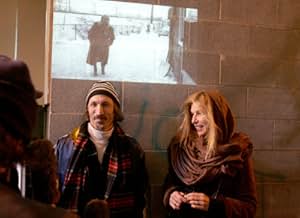AVALIAÇÃO DA IMDb
7,4/10
42 mil
SUA AVALIAÇÃO
A vida de um nova-iorquino leva uma sacudida quando sua prima mais nova lhe faz uma visita surpresa e dá início a uma aventura imprevisível.A vida de um nova-iorquino leva uma sacudida quando sua prima mais nova lhe faz uma visita surpresa e dá início a uma aventura imprevisível.A vida de um nova-iorquino leva uma sacudida quando sua prima mais nova lhe faz uma visita surpresa e dá início a uma aventura imprevisível.
- Prêmios
- 8 vitórias e 2 indicações no total
- Direção
- Roteiristas
- Elenco e equipe completos
- Produção, bilheteria e muito mais no IMDbPro
Avaliações em destaque
Life is strikingly uneventful for Willie, played by renaissance man John Lurie, who refers to himself as a hipster and lives in New York City, and his interactions with his Hungarian cousin Eva, played by avant-garde actress-musician Eszter Balint, and his best friend Eddie, played by yet another actor-musician Richard Edson, who dresses exactly like Willie. Indeed, both males are swarthy with hook noses and fedoras. They have such little interest in or knowledge of anything that their eventual vacation is no different from home.
The quirky way to three-act story format is a succession of single-shot scenes punctuated by black leader, and the clear-cut partition of the story into three straightforward, facetiously named episodes. Yet there are other ceremonial characteristics of substance: Tom DiCillo's black-and-white camera work, which provides Jarmusch's acute impression for the American panorama; and the arresting appliance of music, which favorably apposes Screamin' Jay Hawkins's I Put a Spell on You with the folksy tinges of John Lurie's score for string quartet. This is definitely a road movie, but one with a distinction: Different from most instances of the then still immensely fashionable genre, Stranger Than Paradise appeared simultaneously comprehensively American and strangely European.
The oddly enlightening aggregate of involvement and reserve may be found in the film's lovingly absurd view of Willie's chic affectations, its quaint posture toward some of the inanities of American culture and in the way it harmonizes a decidedly American genre and decidedly American plot---if a narrative as gravely sparse and as concentrated on dead moments may be dubbed a plot---with all form of un-Hollywood expression. The look, rhythm, cast and mainly dismal feel bring to mind not The Blues Brothers, or even the rather subdued Last Detail, but the beginnings of the degree of minimalism to which Jarmusch would take his later work.
However he also loves various attributes of popular culture. See how Willie and Eva watch Forbidden Planet on TV or go with Eddie and Eva's discouraged fancier to see a bone-crunching Hong Kong martial-arts flick at a Cleveland grindhouse, and lets them neighbor more virtuous aspects of his films, in such a way that there is no discrepancy between high and low. And it's for that scarce but wholly judicious mindset that Jarmusch is to be particularly noted. It's doable to distinguish his connection with a gamut of later American indie directors, specifically in his desert drollery, his passionately entertained captivation with slackers of sundry kinds, his concern with sequential framework, his affinity for severely subdued stories, and his clever, antiquated references to popular culture. All these, at a time scarce in American cinema, are now pretty ubiquitous. But the rhyme, the unabashed regard for cinema as a quality, production, expression, a realm, according to aesthetic principles, of what is beautiful, appealing, or of more than ordinary significance, even the mundanities of life and the most everyday scenery possible, that can confront crucial, important matters is far more difficult to come across.
Considering, in the end, no matter how amusing, stylized, minute or insignificant his films may strike one at first, they are always about something. For all his cinephilia, they're inspired not, like Tarantino and Rodriguez, by other movies, but by life: by real people, encountering real feelings. And while this black-and-white deadpan pop culture satire may be a comedy, an dissection of cinematic storytelling, and a thoroughly cynical yarn, it's also a film about America and the people who live there. It's about those people's connections to each other, and their connections to the rooms they populate, the city streets, the suburbs, diners and highways. And it's made by someone who knows there may be reality in abstraction, who finds a visceral alliteration separating a snow-coated Lake Erie and a barren Florida beach, and who fashions an implausibly true character like Aunt Lotte, always jabbering to her tender company in Hungarian, whether they're listening or not.
The quirky way to three-act story format is a succession of single-shot scenes punctuated by black leader, and the clear-cut partition of the story into three straightforward, facetiously named episodes. Yet there are other ceremonial characteristics of substance: Tom DiCillo's black-and-white camera work, which provides Jarmusch's acute impression for the American panorama; and the arresting appliance of music, which favorably apposes Screamin' Jay Hawkins's I Put a Spell on You with the folksy tinges of John Lurie's score for string quartet. This is definitely a road movie, but one with a distinction: Different from most instances of the then still immensely fashionable genre, Stranger Than Paradise appeared simultaneously comprehensively American and strangely European.
The oddly enlightening aggregate of involvement and reserve may be found in the film's lovingly absurd view of Willie's chic affectations, its quaint posture toward some of the inanities of American culture and in the way it harmonizes a decidedly American genre and decidedly American plot---if a narrative as gravely sparse and as concentrated on dead moments may be dubbed a plot---with all form of un-Hollywood expression. The look, rhythm, cast and mainly dismal feel bring to mind not The Blues Brothers, or even the rather subdued Last Detail, but the beginnings of the degree of minimalism to which Jarmusch would take his later work.
However he also loves various attributes of popular culture. See how Willie and Eva watch Forbidden Planet on TV or go with Eddie and Eva's discouraged fancier to see a bone-crunching Hong Kong martial-arts flick at a Cleveland grindhouse, and lets them neighbor more virtuous aspects of his films, in such a way that there is no discrepancy between high and low. And it's for that scarce but wholly judicious mindset that Jarmusch is to be particularly noted. It's doable to distinguish his connection with a gamut of later American indie directors, specifically in his desert drollery, his passionately entertained captivation with slackers of sundry kinds, his concern with sequential framework, his affinity for severely subdued stories, and his clever, antiquated references to popular culture. All these, at a time scarce in American cinema, are now pretty ubiquitous. But the rhyme, the unabashed regard for cinema as a quality, production, expression, a realm, according to aesthetic principles, of what is beautiful, appealing, or of more than ordinary significance, even the mundanities of life and the most everyday scenery possible, that can confront crucial, important matters is far more difficult to come across.
Considering, in the end, no matter how amusing, stylized, minute or insignificant his films may strike one at first, they are always about something. For all his cinephilia, they're inspired not, like Tarantino and Rodriguez, by other movies, but by life: by real people, encountering real feelings. And while this black-and-white deadpan pop culture satire may be a comedy, an dissection of cinematic storytelling, and a thoroughly cynical yarn, it's also a film about America and the people who live there. It's about those people's connections to each other, and their connections to the rooms they populate, the city streets, the suburbs, diners and highways. And it's made by someone who knows there may be reality in abstraction, who finds a visceral alliteration separating a snow-coated Lake Erie and a barren Florida beach, and who fashions an implausibly true character like Aunt Lotte, always jabbering to her tender company in Hungarian, whether they're listening or not.
The New World: The teenager Eva Molnar (Eszter Balint) arrives from Budapest, Hungary, and goes to the house of his cousin Willie, a.k.a. Bela Molnar (John Lurie) in a dangerous neighborhood in New York. Eva intends to travel to Cleveland to stay with her Aunt Lotte (Cecillia Stark), but the old woman is in the hospital and Eva has to stay with the idle Wille, who is absolutely indifferent to her. They spend their empty days smoking Chesterfield, watching television and playing solitaire and Eva befriends Willie's friend Eddie (Richard Edson). Then Willie and Eddie are connected to Eva and they miss her when she travels to Cleveland.
One Year Later: Willie and Eddie win a large amount in the poker game and they borrow a car and travel to Cleveland to visit Eva. They spend a couple of boring days in the house of Aunt Lotte.
Paradise: Willie and Eddie invite Eva to go on vacation in Florida. However they lose their money in the dog racing. Willie decides to bet their last money in the horse racing and they win money. Meanwhile Eva is wrongly taken by another woman and receives a large amount from a stranger. She leaves money for Willie and Eddie and goes to the airport expecting to travel to Europe, but there is only one flight to Budapest. Meanwhile Willie and Eddie seek her out in the airport. Will Willie find Eva?
"Stranger than Paradise" is an ironic and weird tale of emptiness and boredom by Jim Jarmusch, filmed in black and white and divided in three segments (acts). There are funny moments, like for example, when Willie has a phone conversation with his Aunt Lotte and tells that Eva will put his life on hold since the guy spends the days smoking, watching television, playing solitaire and gambling in the horse racing. Then he misses Eva, probably the only different thing that had happened in his boring and empty life. In the end, it is hilarious when Eddie asks to himself: What will Willie do in Budapest? "Stranger than Paradise" is not for every audience but those viewers that also enjoy cinema as art. My vote is eight.
Title (Brazil): "Estranhos no Paraíso" ("Stranger in the Paradise")
One Year Later: Willie and Eddie win a large amount in the poker game and they borrow a car and travel to Cleveland to visit Eva. They spend a couple of boring days in the house of Aunt Lotte.
Paradise: Willie and Eddie invite Eva to go on vacation in Florida. However they lose their money in the dog racing. Willie decides to bet their last money in the horse racing and they win money. Meanwhile Eva is wrongly taken by another woman and receives a large amount from a stranger. She leaves money for Willie and Eddie and goes to the airport expecting to travel to Europe, but there is only one flight to Budapest. Meanwhile Willie and Eddie seek her out in the airport. Will Willie find Eva?
"Stranger than Paradise" is an ironic and weird tale of emptiness and boredom by Jim Jarmusch, filmed in black and white and divided in three segments (acts). There are funny moments, like for example, when Willie has a phone conversation with his Aunt Lotte and tells that Eva will put his life on hold since the guy spends the days smoking, watching television, playing solitaire and gambling in the horse racing. Then he misses Eva, probably the only different thing that had happened in his boring and empty life. In the end, it is hilarious when Eddie asks to himself: What will Willie do in Budapest? "Stranger than Paradise" is not for every audience but those viewers that also enjoy cinema as art. My vote is eight.
Title (Brazil): "Estranhos no Paraíso" ("Stranger in the Paradise")
10romper-2
I just finished watching Stranger Than Paradise on DVD - the first time I'd seen it since its year of release. I'd always recalled the film with fondness, although I could never remember why I liked it. Several years after seeing the movie I came across the John Lurie soundtrack and bought it without stopping to listen, and been slightly taken aback by it. The haunting pieces were more emotionally esoteric than I expected, and it took some time for the album to grow on me.
Seeing the movie again, I understand why. The only piece of popular music in the film is Screamin' Jay Hawkin's "I Put a Spell on You" and, although I had forgotten that it was there, I guess that I had expected the soundtrack to be more like those of mainstream movies and have songs and such-like. I think that Lurie's music is perfect in situ and, as I've said, the soundtrack has also grown on me as standalone pieces.
The movie itself is a masterpiece. The black and white images present a starkness and a clarity that heightens the alienation of self in a land that was supposed to be the new hope for immigrants from a decaying old world. Instead we see Eva walking through a deserted ghost world of New York where the graffiti says "Yankee go home". America is only a dream, a collective vision of a better world; paradise somewhere on earth.
As Willie and Eddie journey west after winning some money, we see that the supposedly beautiful city of Cleveland is cold and desolate with a frozen lake. The further trip to Florida ends in the middle of nowhere next to a bleak and windswept ocean. Paradise is still somewhere out of reach. I think that's why the movie appeals to me. It shows that the America of popular mythology - the home of the brave, land of the free, protector of the downtrodden, guardian of democracy in the free world - is merely a construct. Too many people these days believe in the child's fantasy of America being some paradise that Iraq and Afghanistan should emulate. Jarmusch reminds us that it is people who give meaning to a symbol, not the other way around. He allows for the ability of people to make their own meanings and evolve beyond the stagnation of popular culture.
At a time I originally saw this movie I had recently left home and got my first job, moving from the country to the city, and maybe to some extent I identified with Eva - moving from Budapest to America. It was also my first taste of grownup film, if I recall correctly, and confirmed me with a lifelong fascination with the cinema. I have a lot to thank Jim Jarmusch for.
Seeing the movie again, I understand why. The only piece of popular music in the film is Screamin' Jay Hawkin's "I Put a Spell on You" and, although I had forgotten that it was there, I guess that I had expected the soundtrack to be more like those of mainstream movies and have songs and such-like. I think that Lurie's music is perfect in situ and, as I've said, the soundtrack has also grown on me as standalone pieces.
The movie itself is a masterpiece. The black and white images present a starkness and a clarity that heightens the alienation of self in a land that was supposed to be the new hope for immigrants from a decaying old world. Instead we see Eva walking through a deserted ghost world of New York where the graffiti says "Yankee go home". America is only a dream, a collective vision of a better world; paradise somewhere on earth.
As Willie and Eddie journey west after winning some money, we see that the supposedly beautiful city of Cleveland is cold and desolate with a frozen lake. The further trip to Florida ends in the middle of nowhere next to a bleak and windswept ocean. Paradise is still somewhere out of reach. I think that's why the movie appeals to me. It shows that the America of popular mythology - the home of the brave, land of the free, protector of the downtrodden, guardian of democracy in the free world - is merely a construct. Too many people these days believe in the child's fantasy of America being some paradise that Iraq and Afghanistan should emulate. Jarmusch reminds us that it is people who give meaning to a symbol, not the other way around. He allows for the ability of people to make their own meanings and evolve beyond the stagnation of popular culture.
At a time I originally saw this movie I had recently left home and got my first job, moving from the country to the city, and maybe to some extent I identified with Eva - moving from Budapest to America. It was also my first taste of grownup film, if I recall correctly, and confirmed me with a lifelong fascination with the cinema. I have a lot to thank Jim Jarmusch for.
Odd and inspiring. This film rings true with rich detail in its depictions of utter loneliness. Smoking many Chesterfields, watching television, playing solitaire, visiting Aunt Lottie, sightseeing at Lake Erie (for God's sake). It alters from tragic to comic from almost moment to moment, and often has a foot in both pools.
Jarmusch is minimalist to the core with this one, and yet manages to pull off a solid story. A small black and white gem that deserves a larger audience.
Jarmusch is minimalist to the core with this one, and yet manages to pull off a solid story. A small black and white gem that deserves a larger audience.
Jarmusch was never much of a guy to dip in the mainstream; "Ghost Dog: Way of the Samurai" is about as Hollywood as you're going to get from him. His recent "Coffee and Cigarettes" might have alluded to his roots as an indie filmmaker, but its stories are monochromatic and offer little emotional variety save for the Albert Molina vignette. His best film might be this one, a miniature masterpiece that is underrated when compared to his other stuff. The basic premise of the film revolves around a New York immigrant from Eastern Europe, his goofy buddy, and his female cousin who comes to visit him and America as they jump from state to state.
There isn't much of a plot for sure, but Jarmusch more than compensates for this fact by creating three distinct characters that manage to be sweet without resorting to cheap sentiment. These guys might be rude and frivolous at times, but they never lose their sense of embarrassed compassion, nor as a direct result their humanity as complete characters as well. There's a morose wit to all of these proceedings. All three actors truly seem to have a playful camaraderie, working the motions of a natural friendship with Jarmusch's direction that shows them at their happiest only to be disappointed again and again, like a kid getting clothes instead of video games at Christmas once more. This honest and easygoing subtext doesn't include undemanding Hollywood moments of syrupy tenderness or mawkish emotion. For once, the clichéd adage of characters writing themselves is probably true here, as the film has an almost improvised quality to it. Jarmusch gets the careful balance between static ugliness and a subtext of natural warmth just right.
While the great heart of this film lies in its characterization, it's catapulted into greatness because of Jarmusch's quiet touch. In nearly every one of his films the director is obsessed with the awkward silences that make up nearly every relationship. He's much more revealing with the silences here, fleshing out character development in a car ride or while staring out at the blankness of snowy Cleveland. This brings me to my final point that Jarmusch again does with intelligence. When the characters move from city to city, they have a passionate belief that what they will find is something unbelievable. But the New York we see is a bunch of back alleys and graffiti. Cleveland is a blank white expanse, strangely vapid as opposed to pictorial. And Florida has to be the ugliest Florida ever depicted on screen, consisting mainly of a "Welcome to Florida" sign and a decrepit motel. While the main message is that life is often full of disappointments, that life is rarely full of transcendent moments, people can still connect with each other regardless of their surrounding environments. It's Jarmusch's best statement yet, and it's for these reasons this one must be seen even before even his fine "Mystery Train." The film, essentially a three-character comedy, is also thankfully kept brief, becoming genuinely meaningful and moving as a result.
There isn't much of a plot for sure, but Jarmusch more than compensates for this fact by creating three distinct characters that manage to be sweet without resorting to cheap sentiment. These guys might be rude and frivolous at times, but they never lose their sense of embarrassed compassion, nor as a direct result their humanity as complete characters as well. There's a morose wit to all of these proceedings. All three actors truly seem to have a playful camaraderie, working the motions of a natural friendship with Jarmusch's direction that shows them at their happiest only to be disappointed again and again, like a kid getting clothes instead of video games at Christmas once more. This honest and easygoing subtext doesn't include undemanding Hollywood moments of syrupy tenderness or mawkish emotion. For once, the clichéd adage of characters writing themselves is probably true here, as the film has an almost improvised quality to it. Jarmusch gets the careful balance between static ugliness and a subtext of natural warmth just right.
While the great heart of this film lies in its characterization, it's catapulted into greatness because of Jarmusch's quiet touch. In nearly every one of his films the director is obsessed with the awkward silences that make up nearly every relationship. He's much more revealing with the silences here, fleshing out character development in a car ride or while staring out at the blankness of snowy Cleveland. This brings me to my final point that Jarmusch again does with intelligence. When the characters move from city to city, they have a passionate belief that what they will find is something unbelievable. But the New York we see is a bunch of back alleys and graffiti. Cleveland is a blank white expanse, strangely vapid as opposed to pictorial. And Florida has to be the ugliest Florida ever depicted on screen, consisting mainly of a "Welcome to Florida" sign and a decrepit motel. While the main message is that life is often full of disappointments, that life is rarely full of transcendent moments, people can still connect with each other regardless of their surrounding environments. It's Jarmusch's best statement yet, and it's for these reasons this one must be seen even before even his fine "Mystery Train." The film, essentially a three-character comedy, is also thankfully kept brief, becoming genuinely meaningful and moving as a result.
Você sabia?
- CuriosidadesDirector Jim Jarmusch was dismayed to discover all the money he paid for the rights to Screamin' Jay Hawkins' "I Put a Spell on You" went to the record company, with nothing going to Hawkins himself. When the film earned a profit, Jarmusch took it upon himself to track down Hawkins (who was living in a trailer park, at the time) and give him some money. It was the beginning of a friendship that lasted until Hawkins' death. According to Jarmusch, Hawkins continuously swore he'd pay him back, despite Jarmusch's insistence that the money was a gift.
- Erros de gravaçãoWhen Eddie and Willie are driving to Cleveland, the camera and camera operator can be seen in the reflection of the rear view mirror.
- ConexõesEdited from Stranger than Paradise (1983)
- Trilhas sonorasI Put a Spell on You
Written by Screamin' Jay Hawkins (as Jay Hawkins)
Used by permission of CBS Unart Catalog, Inc.
All Rights Reserved.
Performed by Screamin' Jay Hawkins
Courtesy of CBS Records
Principais escolhas
Faça login para avaliar e ver a lista de recomendações personalizadas
- How long is Stranger Than Paradise?Fornecido pela Alexa
Detalhes
- Data de lançamento
- Países de origem
- Idiomas
- Também conhecido como
- Stranger Than Paradise
- Locações de filme
- 464 Newark St, Hoboken, Nova Jersey, EUA(Corner building when Eva first arrives and walks to apartment)
- Empresas de produção
- Consulte mais créditos da empresa na IMDbPro
Bilheteria
- Orçamento
- US$ 90.000 (estimativa)
- Faturamento bruto nos EUA e Canadá
- US$ 2.436.000
- Faturamento bruto mundial
- US$ 2.454.393
- Tempo de duração1 hora 29 minutos
- Cor
- Proporção
- 1.85 : 1
Contribua para esta página
Sugerir uma alteração ou adicionar conteúdo ausente

Principal brecha
By what name was Estranhos no Paraíso (1984) officially released in India in English?
Responda




























